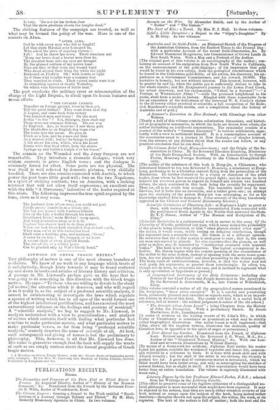LINWOOD ON GREEN TRAGIC METRES.*
THE philosophy of metres is one of the most obscure branches of resthetics. We know of no work in any language which treats of it satisfactorily, though hints towards it may be found scattered up and down in books and articles of literary history and criticism. A passage in Mr. Linwood's preface gave us the hope that he was going to do something in this direction with the Greek tragic metres. He says—" To those who are willing to devote to the study [of metres] the attention which it deserves, and who will regard it as it really is, as the subject of a profound scientific analysis, it cannot be uninteresting to investigate the laws which regulate a species of writing which has in all ages of the world formed one of the highest intellectual gratifications, and has exercised the most extraordinary influence on the feelings and passions of mankind." A " scientific analysis," we beg to suggest to Mr. Linwood, is analysis undertaken with a view to generalization ; and analysis of metres which contents itself with finding what particular feet combine to make particular metres, and what particular metres to make particular verses, so far from being "profound scientific analysis," scarcely deserves the name of scientific at all. At best, such arrangement and giving of names is but the preliminary to philosophy: This, however, is all that Mr. Linwood has done. His name is guarantee enough that the book will supply the wants of such as are simply curious about the formal properties of Greek tragic metres.
• A Treatise on Greek Tragic Metres, with the Cherie Parts of Sophocles metri- cally arranged. Ely the Rey. W. Linwood, late Student of Christ Church, Oxford. Published by Longman and Co.






























 Previous page
Previous page